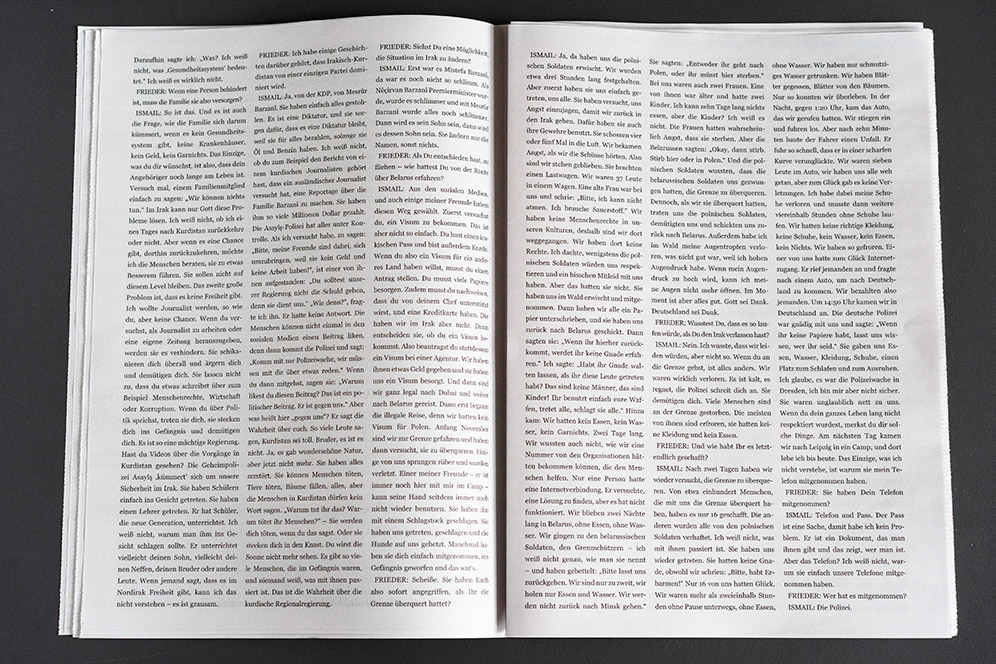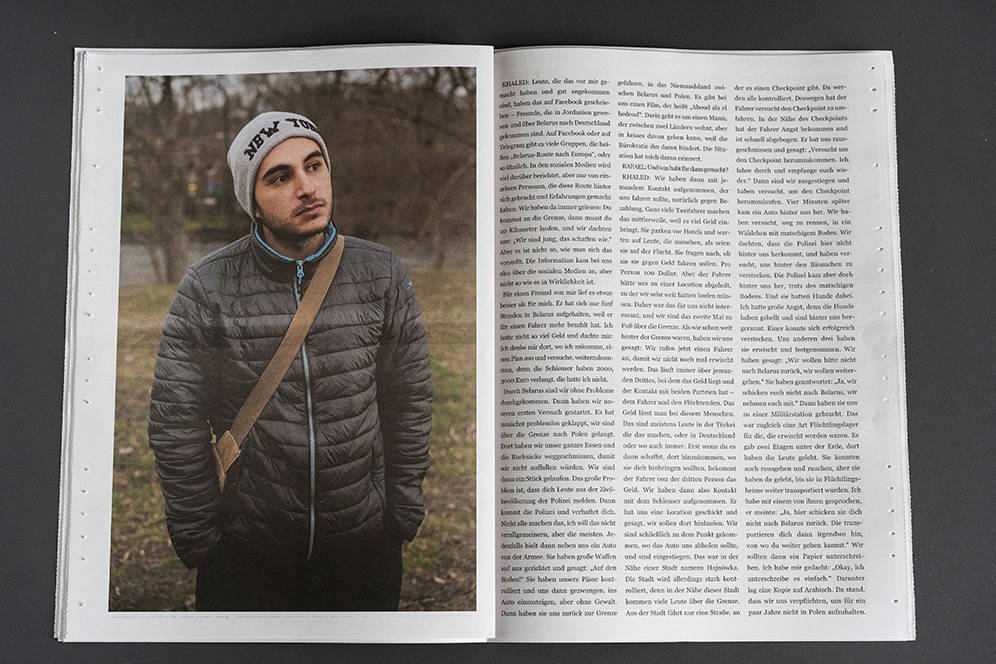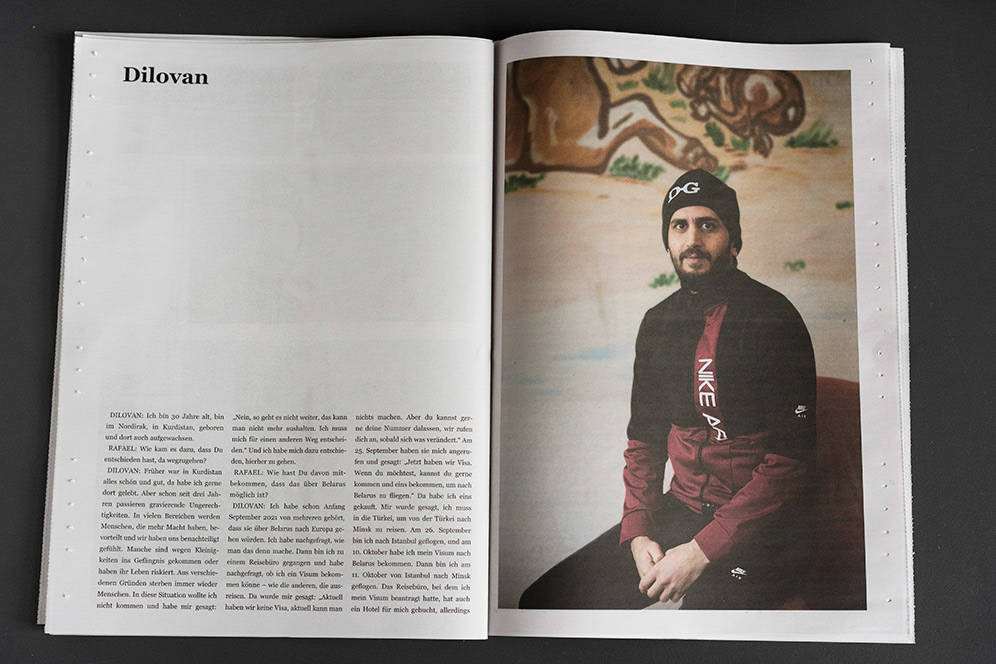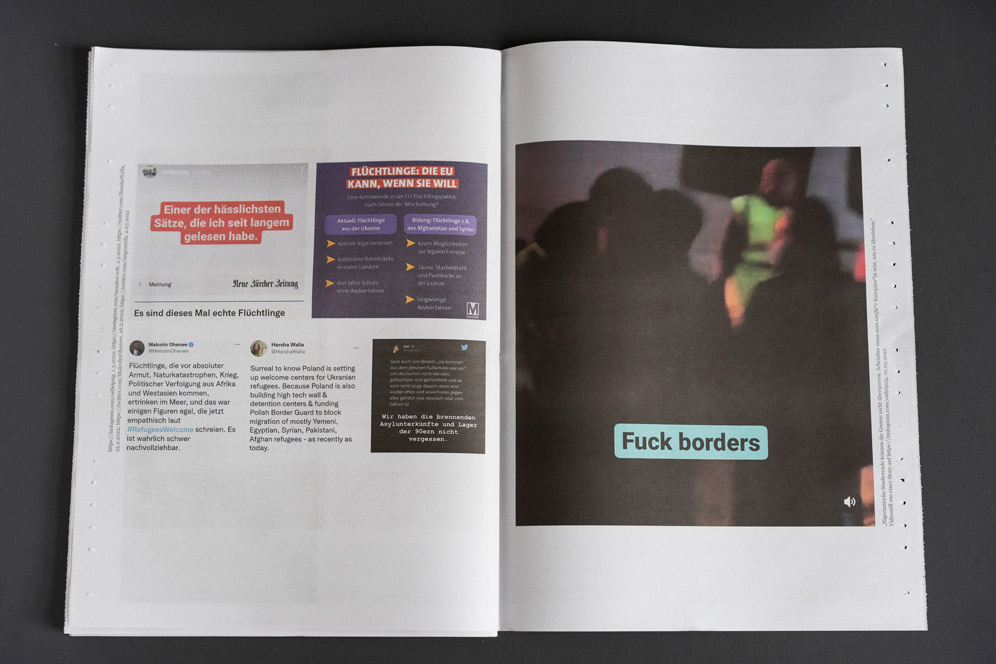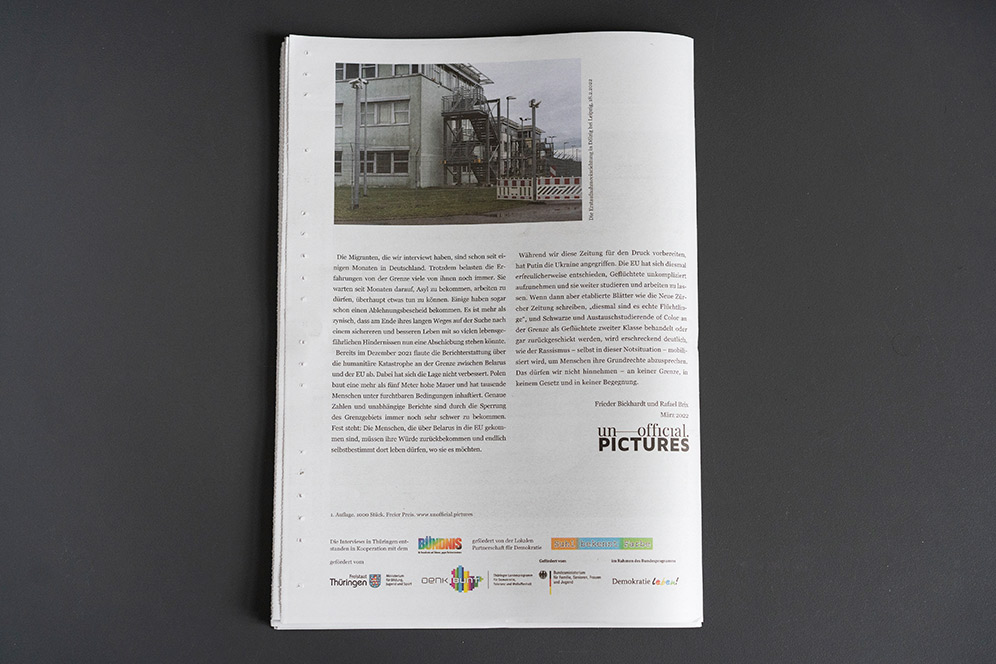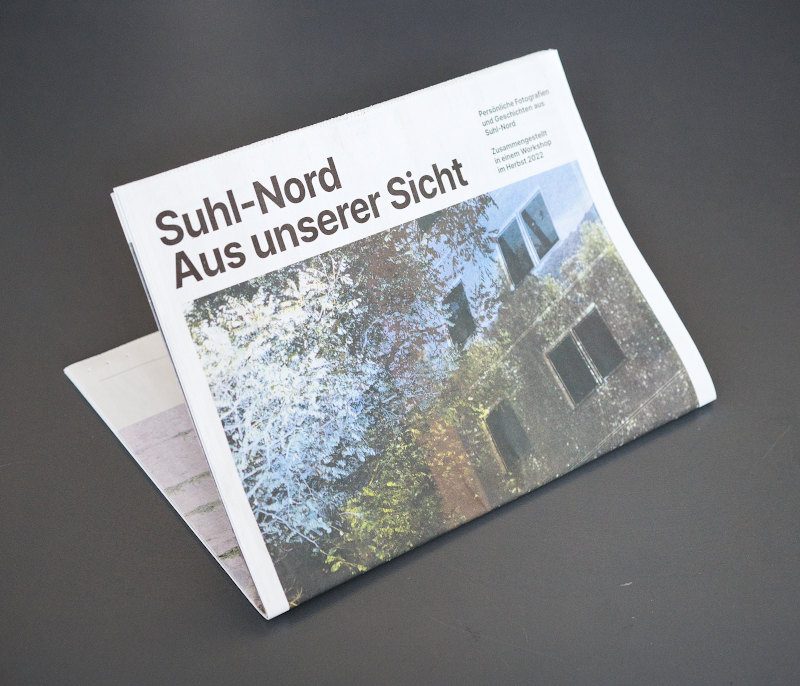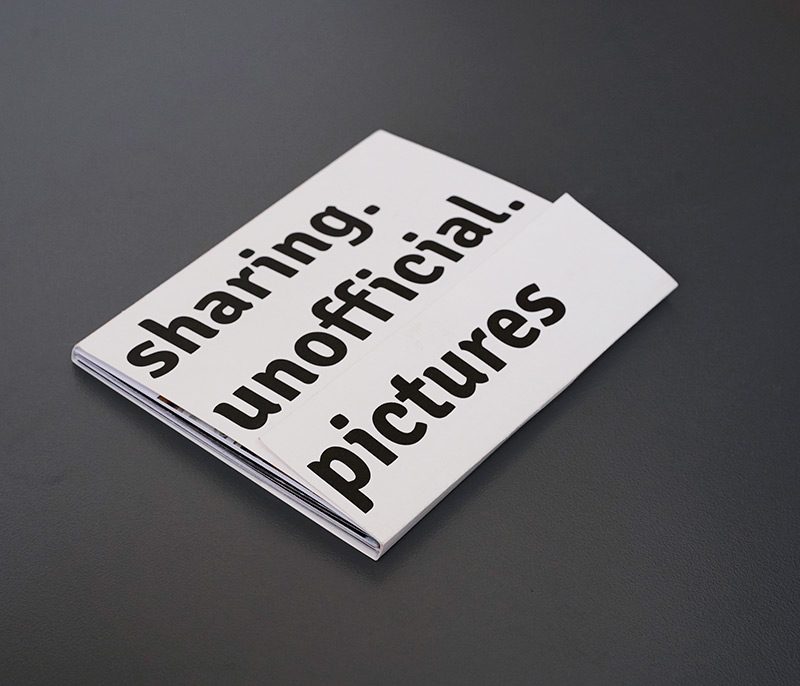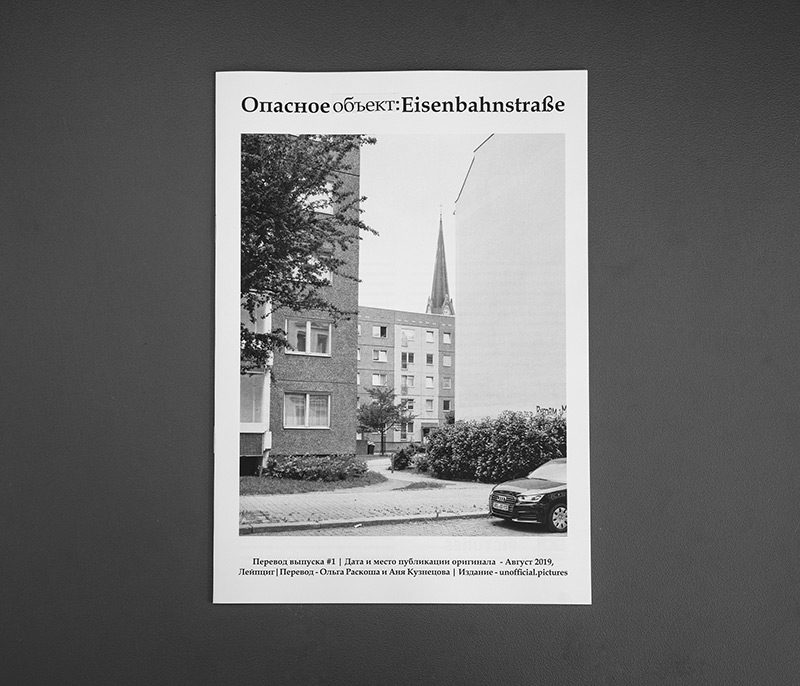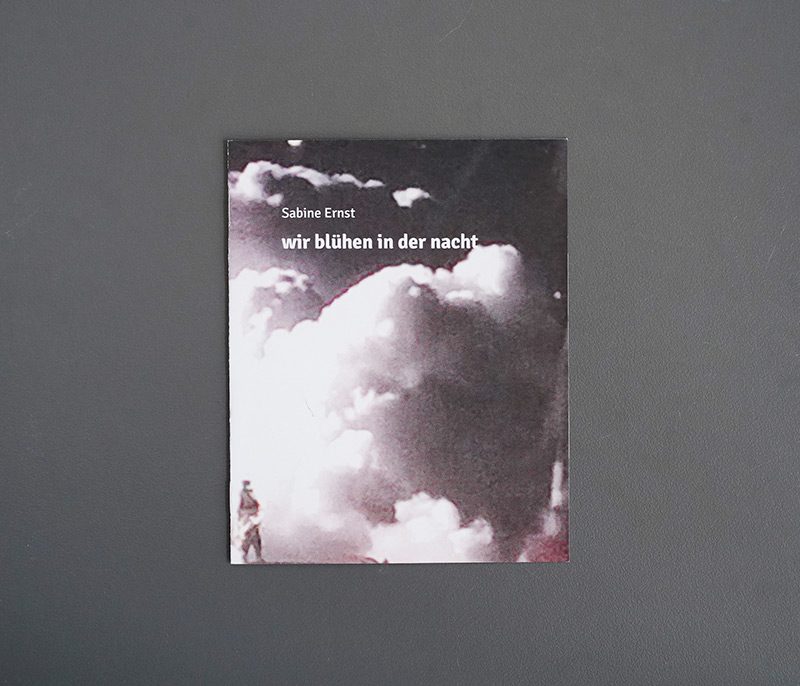Description
In the fall of 2021, the so-called “refugee crisis” on the EU’s eastern border was still very much in the news. Commission President Ursula von der Leyen spoke of solidarity with Poland in the face of a “hybrid attack [by Belarus] to destabilize Europe” – not a word of solidarity with the freezing migrants exposed to violence. They are dehumanized in such rhetoric, turned into a diffuse mass that is then either pitied or seen as a threat. With this newspaper we want to make them visible as human beings.
Four migrants who were living in camps in Saxony and Thuringia at the time of the interviews have agreed to tell us about their difficult experiences – about violence on the Belarusian, Lithuanian and Polish side, about arrests and illegal pushbacks. About their reasons for leaving their homeland and their families. But also about the difficult arrival in Germany. In February 2022, we conducted four interviews, with interpreters or in English. We took portraits and they gave us their own cell phone photos. The interviews do not represent everyone’s experiences. For example, the perspectives of FLINTA* people, of children, but also of people from other countries of origin are missing. Their experiences appear in the narratives to some extent. We also browsed a Telegram group and a Facebook page, which serve as a kind of picture desk from below. The migrants themselves post their pictures and videos here: of freezing in the cold, of breaking through the barbed wire fences, of soldiers and dog patrols, of their injuries and also of the dead of this border.
The migrants we interviewed have been in Germany for several months. Nevertheless, the experiences of the border still weigh heavily on many of them. They have been waiting for months to be granted asylum, to be allowed to work, to be able to do anything at all. Some have even already received a rejection letter. It is more than cynical that at the end of their long journey in search of a safer and better life with so many life-threatening obstacles, they could now face deportation.
As early as December 2021, news coverage of the humanitarian catastrophe on the border between Belarus and the EU died down. Yet the situation has not improved. Poland is building a wall more than five meters high and has detained thousands of people in terrible conditions. Accurate numbers and independent reports are still very difficult to get due to the closure of the border area. One thing is certain: The people who came to the EU via Belarus must get back their dignity and finally be allowed to live self-determined where they want to.
While we are preparing this newspaper for printing, Putin has attacked Ukraine. Fortunately, this time the EU has decided to accept refugees without complications and to let them continue to study and work. But when established papers like the Neue Zürcher Zeitung then write, “this time they are real refugees,” and Black and exchange students of Color are treated as second-class refugees at the border or even sent back, it becomes frighteningly clear how racism is mobilized – even in this emergency situation – to deny people their basic rights. We must not accept this – at any border, in any law, in any encounter.
March 2022, unofficial.picturesIn the fall of 2021, the so-called “refugee crisis” on the EU’s eastern border was still very much in the news. Commission President Ursula von der Leyen spoke of solidarity with Poland in the face of a “hybrid attack [by Belarus] to destabilize Europe” – not a word of solidarity with the freezing migrants exposed to violence. They are dehumanized in such rhetoric, turned into a diffuse mass that is then either pitied or seen as a threat. With this newspaper we want to make them visible as human beings.
Four migrants who were living in camps in Saxony and Thuringia at the time of the interviews have agreed to tell us about their difficult experiences – about violence on the Belarusian, Lithuanian and Polish side, about arrests and illegal pushbacks. About their reasons for leaving their homeland and their families. But also about the difficult arrival in Germany. In February 2022, we conducted four interviews, with interpreters or in English. We took portraits and they gave us their own cell phone photos. The interviews do not represent everyone’s experiences. For example, the perspectives of FLINTA* people, of children, but also of people from other countries of origin are missing. Their experiences appear in the narratives to some extent. We also browsed a Telegram group and a Facebook page, which serve as a kind of picture desk from below. The migrants themselves post their pictures and videos here: of freezing in the cold, of breaking through the barbed wire fences, of soldiers and dog patrols, of their injuries and also of the dead of this border.
The migrants we interviewed have been in Germany for several months. Nevertheless, the experiences of the border still weigh heavily on many of them. They have been waiting for months to be granted asylum, to be allowed to work, to be able to do anything at all. Some have even already received a rejection letter. It is more than cynical that at the end of their long journey in search of a safer and better life with so many life-threatening obstacles, they could now face deportation.
As early as December 2021, news coverage of the humanitarian catastrophe on the border between Belarus and the EU died down. Yet the situation has not improved. Poland is building a wall more than five meters high and has detained thousands of people in terrible conditions. Accurate numbers and independent reports are still very difficult to get due to the closure of the border area. One thing is certain: The people who came to the EU via Belarus must get back their dignity and finally be allowed to live self-determined where they want to.
While we are preparing this newspaper for printing, Putin has attacked Ukraine. Fortunately, this time the EU has decided to accept refugees without complications and to let them continue to study and work. But when established papers like the Neue Zürcher Zeitung then write, “this time they are real refugees,” and Black and exchange students of Color are treated as second-class refugees at the border or even sent back, it becomes frighteningly clear how racism is mobilized – even in this emergency situation – to deny people their basic rights. We must not accept this – at any border, in any law, in any encounter.
March 2022, unofficial.pictures





